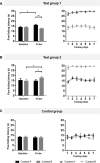A Context-Based Analgesia Model in Rats: Involvement of Prefrontal Cortex
- PMID: 30178433
- PMCID: PMC6246847
- DOI: 10.1007/s12264-018-0279-6
A Context-Based Analgesia Model in Rats: Involvement of Prefrontal Cortex
Abstract
Cognition and pain share common neural substrates and interact reciprocally: chronic pain compromises cognitive performance, whereas cognitive processes modulate pain perception. In the present study, we established a non-drug-dependent rat model of context-based analgesia, where two different contexts (dark and bright) were matched with a high (52°C) or low (48°C) temperature in the hot-plate test during training. Before and after training, we set the temperature to the high level in both contexts. Rats showed longer paw licking latencies in trials with the context originally matched to a low temperature than those to a high temperature, indicating successful establishment of a context-based analgesic effect in rats. This effect was blocked by intraperitoneal injection of naloxone (an opioid receptor antagonist) before the probe. The context-based analgesic effect also disappeared after optogenetic activation or inhibition of the bilateral infralimbic or prelimbic sub-region of the prefrontal cortex. In brief, we established a context-based, non-drug dependent, placebo-like analgesia model in the rat. This model provides a new and useful tool for investigating the cognitive modulation of pain.
Keywords: Cognition modulation; Context-based analgesia; Hot-plate test; Opioid system; Pain; Placebo analgesia; Prefrontal cortex.
Conflict of interest statement
The authors claim no competing interests.
Figures






Similar articles
-
Profound, non-opioid analgesia produced by the high-efficacy 5-HT(1A) agonist F 13640 in the formalin model of tonic nociceptive pain.Pharmacology. 2003 Apr;67(4):182-94. doi: 10.1159/000068404. Pharmacology. 2003. PMID: 12595749
-
mu- but not delta- and kappa-opioid receptors in the ventrolateral orbital cortex mediate opioid-induced antiallodynia in a rat neuropathic pain model.Brain Res. 2006 Mar 3;1076(1):68-77. doi: 10.1016/j.brainres.2006.01.018. Epub 2006 Feb 13. Brain Res. 2006. PMID: 16476416
-
A new animal model of placebo analgesia: involvement of the dopaminergic system in reward learning.Sci Rep. 2015 Nov 25;5:17140. doi: 10.1038/srep17140. Sci Rep. 2015. PMID: 26602173 Free PMC article.
-
Neuroimaging as a tool to investigate how cognitive factors influence analgesic drug outcomes.Neurosci Lett. 2012 Jun 29;520(2):149-55. doi: 10.1016/j.neulet.2012.04.043. Epub 2012 Apr 23. Neurosci Lett. 2012. PMID: 22561551 Review.
-
Pain mechanisms: a new theory.Science. 1965 Nov 19;150(3699):971-9. doi: 10.1126/science.150.3699.971. Science. 1965. PMID: 5320816 Review. No abstract available.
Cited by
-
A Free-Operant Reward-Tracking Paradigm to Study Neural Mechanisms and Neurochemical Modulation of Adaptive Behavior in Rats.Int J Mol Sci. 2019 Jun 25;20(12):3098. doi: 10.3390/ijms20123098. Int J Mol Sci. 2019. PMID: 31242610 Free PMC article.
-
Failure of Placebo Analgesia Model in Rats with Inflammatory Pain.Neurosci Bull. 2020 Feb;36(2):121-133. doi: 10.1007/s12264-019-00420-6. Epub 2019 Aug 21. Neurosci Bull. 2020. PMID: 31435837 Free PMC article.
-
Engaging endogenous opioid circuits in pain affective processes.J Neurosci Res. 2022 Jan;100(1):66-98. doi: 10.1002/jnr.24762. Epub 2020 Dec 13. J Neurosci Res. 2022. PMID: 33314372 Free PMC article. Review.
-
KCNQ Channels in the Mesolimbic Reward Circuit Regulate Nociception in Chronic Pain in Mice.Neurosci Bull. 2021 May;37(5):597-610. doi: 10.1007/s12264-021-00668-x. Epub 2021 Apr 26. Neurosci Bull. 2021. PMID: 33900570 Free PMC article.
-
Challenges and opportunities in translational pain research - An opinion paper of the working group on translational pain research of the European pain federation (EFIC).Eur J Pain. 2021 Apr;25(4):731-756. doi: 10.1002/ejp.1730. Epub 2021 Feb 24. Eur J Pain. 2021. PMID: 33625769 Free PMC article.
References
MeSH terms
Substances
LinkOut - more resources
Full Text Sources
Other Literature Sources
Medical

